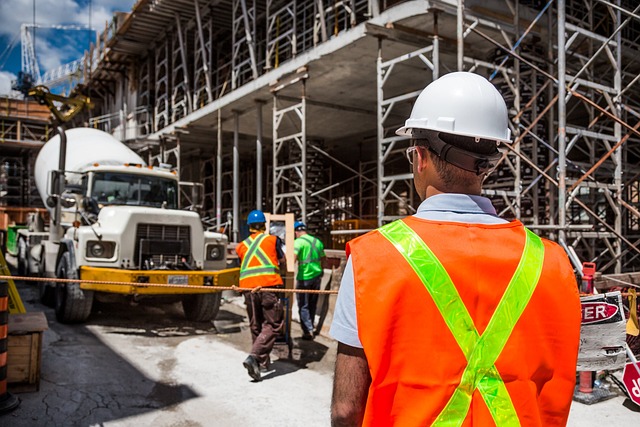Basement water damage from plumbing faults, rainfall, or humidity can cause severe structural problems, mold growth, and damaged belongings. Foundation contractors offer prompt solutions like waterproofing to protect homes' foundations long-term. They identify water ingress points, apply coatings, install drainage systems, and seal gaps, ensuring a dry living environment. Regular basement inspections for signs of moisture are crucial; look for mold, peeling paint, and musty odours. Waterproofing membranes repel moisture, and proper drainage systems divert surface water to prevent water intrusion. Water-damaged basements require immediate attention from foundation contractors who assess damage, remove contaminated materials, fix structural issues, and implement tailored waterproofing solutions. Regular maintenance including ventilation, leak repair, and crack fixing prevents future water damage.
Basement waterproofing is a crucial aspect of home maintenance, especially in regions with high precipitation. Understanding water damage’s common causes and effects is the first step toward prevention. This article guides you through the process, from identifying signs of water intrusion by evaluating your basement to choosing the right materials for waterproofing. We also outline a step-by-step repair guide and offer maintenance tips to keep your basement dry, with a special focus on the role foundation contractors play in ensuring long-lasting protection.
Understanding Basement Water Damage: Common Causes and Effects

Basement water damage is a common issue that can lead to serious problems if left unchecked. Understanding the causes and effects is essential for homeowners, especially when considering solutions like basement waterproofing from Foundation Contractors. Common causes include faulty plumbing, heavy rainfall, melting snow, and high humidity levels. These factors can result in seepage, leaks, or flooding, which over time can cause structural damage, promote mold growth, and encourage the development of dangerous mold spores.
The effects of water damage are far-reaching. It can weaken the basement walls, causing cracks to appear. Waterlogged floors may become unstable, leading to uneven surfaces. Additionally, water can seep into stored items, causing them to rot or become infested with pests. Severe cases might require complete basement renovations. Prompt action by Foundation Contractors is crucial in mitigating these issues and ensuring the long-term integrity of your home’s foundation.
The Role of Foundation Contractors in Basement Waterproofing

Basement waterproofing is a complex process that often requires professional expertise, and this is where foundation contractors play a pivotal role. These specialists are equipped with the knowledge and tools to address the root causes of basement water issues, ensuring long-lasting solutions. They begin by thoroughly inspecting the basement and identifying potential entry points for water, such as cracks in the foundation, inadequate drainage systems, or faulty sump pumps.
Foundation contractors employ various techniques to waterproof basements, including applying specialized coatings to the walls and floors, installing drainage systems to divert water away from the structure, and sealing any gaps or cracks. Their expertise is invaluable in preventing future moisture problems, protecting homes from costly damage, and maintaining a dry, comfortable living space for homeowners.
Evaluating Your Basement: Signs of Water Intrusion

Evaluating your basement for signs of water intrusion is a crucial step before any waterproofing or repair work begins. Look out for visible indicators such as mold growth, peeling paint, or musty odours, which often signal moisture issues. These problems not only affect the air quality but also indicate potential structural damage caused by water seepage.
Foundation contractors recommend regular inspections to identify cracks in walls or floors, bubbling or blistered paint, or warped doors and windows. Such signs suggest that water is finding its way into your basement, potentially causing long-term damage to your home’s foundation. Addressing these issues promptly through professional waterproofing services will ensure a dry, comfortable living space below ground level.
Effective Waterproofing Techniques for Long-Lasting Protection

Effective waterproofing techniques are essential for protecting your basement from water intrusion, ensuring long-lasting dryness and structural integrity. One proven method involves applying a waterproof membrane to the foundation walls. This barrier repels moisture, preventing it from seeping through cracks and crevices. Foundation contractors often use advanced materials that are flexible yet durable, allowing them to conform to the contours of the wall while maintaining a tight seal.
Another key strategy is proper drainage. Implementing a well-designed drainage system around your home diverts surface water away from the foundation, reducing the likelihood of water pooling and seeping into the basement. This may include installing exterior drains, downspout extensions, and proper grading to ensure water flows away from the structure. Regular maintenance and inspection by foundation contractors can help identify and address any potential issues, ensuring your waterproofing system remains effective over time.
Repairing Water-Damaged Basements: Step-by-Step Guide

Water-damaged basements can be a common problem, but repairing and waterproofing them is essential to prevent further damage and create a dry, livable space. Here’s a step-by-step guide on how to tackle this project with help from professional foundation contractors.
1. Identify the Source: Start by pinpointing where the water is entering. Inspect for cracks in walls, floors, or foundations, as these are common points of leakage. Check for clogged gutters, faulty downspouts, or nearby leaks that might be contributing to the issue. Understanding the source will help you determine the most effective repair method.
2. Examine the Damage: Assess the extent of water damage by evaluating mold growth, rust, or structural issues. Water can weaken foundations, so it’s crucial to address these concerns promptly. Take note of any visible cracks, bulging walls, or signs of moisture intrusion. This step will guide you in choosing the right repair techniques and materials recommended by foundation contractors.
3. Remove Damaged Materials: If mold or water-damaged insulation is present, carefully remove it to prevent further contamination. Use personal protective equipment (PPE) for safety. Discard the damaged items and clean the area thoroughly to ensure a fresh start for repairs.
4. Fix Structural Issues: Address any structural problems like cracked walls or floors by hiring professionals who can repair or replace them. They may use carbon fiber wraps, epoxy injections, or other advanced techniques to strengthen and stabilize the foundation.
5. Implement Waterproofing: Apply a waterproof membrane or coating to the walls and floors. Foundation contractors can recommend suitable products based on your specific needs. Ensure proper installation by following manufacturer guidelines for optimal results.
Choosing the Right Materials for Basement Waterproofing

When it comes to basement waterproofing, selecting the appropriate materials is a pivotal decision. Homeowners should consider their specific needs and climate conditions when choosing products. For instance, a waterproof membrane or coating can effectively seal cracks and prevent water intrusion in regions with moderate humidity. In areas prone to heavy rainfall or flooding, however, more robust solutions like epoxy injection or plastic sheets might be necessary.
Foundation contractors often recommend tailored approaches based on years of experience. They assess factors such as the type of foundation, existing damage, and the severity of water infiltration. The right materials ensure lasting protection, ensuring your basement remains dry and free from potential structural harm over time.
Common Mistakes to Avoid During Basement Repair and Waterproofing

When it comes to basement waterproofing and repair, many homeowners make mistakes that could lead to further damage and costly repairs down the line. One of the most common errors is attempting to tackle the issue yourself if you’re not a professional. Waterproofing requires specialized knowledge and equipment, so delegating the task to experienced foundation contractors is essential. DIY methods might seem appealing, but they often don’t address the root cause of the problem, leading to recurring issues.
Another mistake to avoid is neglecting regular inspection and maintenance. Basements are often overlooked when it comes to home upkeep, but seasonal changes can bring varying weather conditions that may impact your basement’s integrity. Regular checks for cracks, water stains, or signs of moisture intrusion can help identify problems early on. Prompt action by foundation contractors can prevent small issues from turning into major repairs and ensure a dry, healthy living space below ground level.
Maintenance Tips to Keep Your Basement Dry

Regular maintenance is key to keeping your basement dry and preventing costly repairs. One of the most effective measures you can take is to ensure proper ventilation. Check for any blockages or leaks in vents and ensure adequate airflow throughout the space. This helps regulate humidity levels, preventing condensation that can lead to water damage.
Additionally, keep an eye out for signs of seepage or cracks in your basement walls and floor. Promptly address these issues by calling in professional foundation contractors. Regular inspection and repair will save you from major structural problems down the line. Also, consider using a dehumidifier to reduce moisture levels, especially in areas prone to high humidity.
